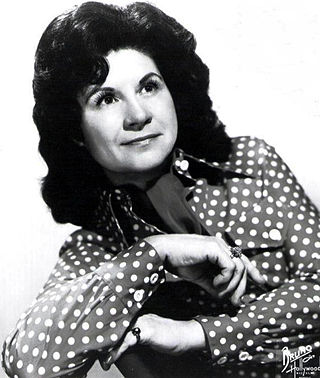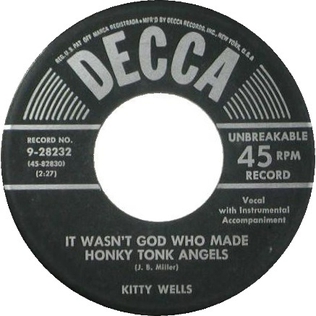The Nashville Sound originated during the mid-1950s as a subgenre of American country music, replacing the chart dominance of the rough honky tonk music, which was most popular in the 1940s and 1950s, with "smooth strings and choruses", "sophisticated background vocals" and "smooth tempos" associated with traditional pop. It was an attempt "to revive country sales, which had been devastated by the rise of rock 'n' roll".

A honky-tonk is both a bar that provides country music for the entertainment of its patrons and the style of music played in such establishments. It can also refer to the type of piano used to play such music. Bars of this kind are common in the South and Southwest United States. Many eminent country music artists, such as Jimmie Rodgers, Ernest Tubb, Lefty Frizzell, Hank Williams, Loretta Lynn, Patsy Cline, Johnny Horton, and Merle Haggard to name a few, began their careers as amateur musicians in honky-tonks.

William Ballard Doggett was an American pianist and organist. He began his career playing swing music before transitioning into rhythm and blues. Best known for his instrumental compositions "Honky Tonk" and "Hippy Dippy", Doggett was a pioneer of rock and roll. He worked with the Ink Spots, Johnny Otis, Wynonie Harris, Ella Fitzgerald, and Louis Jordan.
Polly Adelaide Hendricks Hazelwood, known professionally as Del Wood, was an American pianist.
Outlaw country is a subgenre of American country music created by a small group of iconoclastic artists active in the 1970s and early 1980s, known collectively as the outlaw movement, who fought for and won their creative freedom outside of the Nashville establishment that dictated the sound of most country music of the era. Willie Nelson, Waylon Jennings, Johnny Cash, Kris Kristofferson, and David Allan Coe were among the movement's most commercially successful members.
Gary Ronnie Stewart was an American musician and songwriter, known for his distinctive vibrato voice and his outlaw country sound influenced by southern rock. At the height of his popularity in the mid-1970s, Time magazine described him as the "king of honkytonk." He had a series of country chart hits from the mid- to late 1970s, the biggest of which was "She's Actin' Single ", which topped the U.S. country singles chart in 1975.

Shelton Hank Williams, known as Hank Williams III, is an American musician, singer, songwriter and multi-instrumentalist, known for his fusion of traditional and honky-tonk country music with rockabilly and punk rock. He was the drummer of hardcore punk band Arson Anthem, and bassist of Phil Anselmo's band Superjoint Ritual. He has released eleven studio albums, including five for Curb Records.

Henry William Thompson was an American country music singer-songwriter and musician whose career spanned seven decades.

Ellen Muriel Deason, known professionally as Kitty Wells, was an American pioneering female country music singer. She broke down a barrier for women in country music with her 1952 hit recording "It Wasn't God Who Made Honky Tonk Angels", which also made her the first female country singer to top the U.S. country charts and turned her into the first female country superstar. “It Wasn’t God Who Made Honky Tonk Angels” would also be her first of several pop crossover hits. Wells is the only artist to be awarded top female vocalist awards for 14 consecutive years. Her chart-topping hits continued until the mid-1960s, paving the way for and inspiring a long list of female country singers who came to prominence in the 1960s.

Patty Loveless is an American country music singer. She began performing in her teenaged years before signing her first recording contract with MCA Records' Nashville division in 1985. While her first few releases were unsuccessful, she broke through by decade's end with a cover of George Jones's "If My Heart Had Windows". Loveless issued five albums on MCA before moving to Epic Records in 1993, where she released nine more albums. Four of her albums—Honky Tonk Angel, Only What I Feel, When Fallen Angels Fly, and The Trouble with the Truth—are certified platinum in the United States. Loveless has charted 44 singles on the Billboard Hot Country Songs charts, including five which reached number one: "Timber, I'm Falling in Love", "Chains", "Blame It on Your Heart", "You Can Feel Bad", and "Lonely Too Long".

Frankie Carle was an American pianist and bandleader. As a very popular bandleader in the 1940s and 1950s, Carle was nicknamed "The Wizard of the Keyboard". "Sunrise Serenade" was Carle's best-known composition, rising to No. 1 in the US in 1938 and selling more than one million copies.
This is a list of notable events in country music that took place in 1961.

First performed by Al Montgomery as "Did God Make Honky Tonk Angels" on the Feature label which was owned by songwriter J.D. Miller.

"Honky Tonk Women" is a song by the English rock band the Rolling Stones. It was released as a non-album single on 4 July 1969 in the United Kingdom, and a week later in the United States. It topped the charts in both nations. The song was on Rolling Stone's 500 Greatest Songs of All Time list, and was inducted into the Grammy Hall of Fame.
This is a list of notable events in country music that took place in the year 1955.
This is a list of notable events in country music that took place in the year 1952.

Mark Nelson Chesnutt is an American country music singer and songwriter. Between 1990 and 1999, he had his greatest chart success recording for Universal Music Group Nashville's MCA and Decca branches, with a total of eight albums between those two labels. During this timespan, Chesnutt also charted twenty top-ten hits on the Billboard Hot Country Songs charts, of which eight reached number one: "Brother Jukebox", "I'll Think of Something", "It Sure Is Monday", "Almost Goodbye", "I Just Wanted You to Know", "Gonna Get a Life", "It's a Little Too Late", and a cover of Aerosmith's "I Don't Want to Miss a Thing". His first three albums for MCA along with a 1996 Greatest Hits package issued on Decca are all certified platinum by the Recording Industry Association of America (RIAA); 1994's What a Way to Live, also issued on Decca, is certified gold. After a self-titled album in 2002 on Columbia Records, Chesnutt has continued to record predominantly on independent labels.

Charles Levi Walker was an American country musician. His biggest success was with the song, "Pick Me Up on Your Way Down".
"Honky-Tonk Man" is a song co-written and recorded by American singer Johnny Horton. It was released in March 1956 as his debut single on Columbia Records, and the album of the same name reaching number 9 on the U.S. country singles charts. Horton re-released the song six years later, taking it to number 11 on the same chart.

Adolph John Hofner was an American Western swing bandleader and singer.











